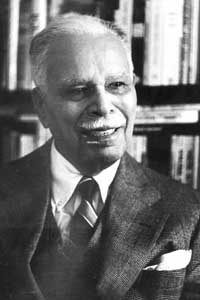Newest Midway garden under construction will honor memory of late professor Allison Davis
By Peter SchulerNews Office
 The late professor Allison Davis Sr. | |
The Dr. Allison Davis Garden, being developed in Washington Park near the west end of the Midway Plaisance, honors the memory of the late Allison Davis Sr., a pioneering scholar in education and other social sciences at the University. The one-acre garden, now under construction, is being created directly east of artist Loredo Taft’s Fountain of Time sculpture. The garden is scheduled for completion by summer 2005.
Landscape architect Peter Lindsey Schaudt, who received a national design award from the American Society of Landscape Architects, has designed the garden with a circular main section that is depressed into the ground. This feature is intended to frame the Fountain of Time on its west edge, while also providing an aesthetic echo with the perennial garden at the east end of the Midway Plaisance in Jackson Park. The garden will be filled with flowers and shrubs and will provide visitors a place to walk and sit.
The Davis Garden will build on the revitalization efforts now taking place in Washington Park, a celebrated urban oasis designed in the late 1800s by the father of American landscaping, Federick Law Olmsted. Completed and near-completed projects in Washington Park include a new mini-arboretum, a fitness center, a lagoon restoration project and the restoration of the reflection pool of Taft’s Fountain of Time sculpture.
The University is the manager of the $800,000 project and has partnered with the Chicago Park District and the Davis family to design and develop the Dr. Allison Davis Garden. The Davis family, the University, the Chicago Park District, the Chicago Community Trust and others have contributed funds to develop the garden.
“The Davis Garden is an important addition to the new capital projects and programming currently underway in Washington Park,” said Timothy Mitchell, general superintendent and CEO of the Chicago Park District. “We hope Washington Park and the Midway bridge neighborhoods of the mid-south and serve as destinations for all Chicagoans.”
Davis was the John Dewey Distinguished Service Professor in Education and one of the first African Americans granted tenure at an academic institution other than a historically black college or university. Davis spent nearly his entire academic career in the University’s former Department of Education, after receiving a doctorate in Anthropology from Chicago in 1942. At his death in 1983, he was the John Dewey Distinguished Service Professor Emeritus in Education. In 1994, the U.S. Postal Service issued a stamp honoring Davis as “one of the earliest challengers of intelligence testing based on cultural bias.”
Davis questioned the indiscriminate use of standardized intelligence tests and fought for the understanding of human potential beyond racial class and caste. His work helped support desegregation efforts and contributed significantly to contemporary thought on valuing the capabilities of youths from diverse backgrounds.
“Allison Davis made an enormous mark as a scholar and teacher in education, social anthropology and psychology, and he also was a powerful force for human understanding,” said President Randel. “This wonderful garden will serve our entire community and is a very fitting way to remember him and all his good works.”
In his book Social-Class Influences on Learning, Intelligence and Cultural Differences, Davis wrote, “If people of different cultures cannot associate freely, they cannot learn one another’s special form of the American language, manners, morals, and social and psychological goals.”
Davis, who had earned an undergraduate degree summa cum laude from Williams College and an M.A. in anthropology from Harvard University, was the first social scientist to carry out intensive comparative studies of the socialization and intelligence of middle-class and lower-class infants, children and adolescents. He also was the first scholar to make a full-length, social and anthropological study of both whites and blacks in Southern society.
His many books include Children of Bondage and Deep South, among the most widely used research on African Americans; his highly influential Social-Class Influences upon Learning, Intelligence and Cultural Differences; and his final book, a psychological study of great African-American leaders, Leadership, Love and Aggression.
Davis’ son, Allison Davis Jr., who led the collaborative effort to create a fitting memorial to his namesake, said, “My father passed the site of this garden every day, crossing a race line from his African-American neighborhood in Woodlawn where our family grew up to his office at the University. Those who helped our family in this effort have created on my father’s walking path a peaceful space of natural beauty that truly honors his life.”
![[Chronicle]](/images/sidebar_header_oct06.gif)